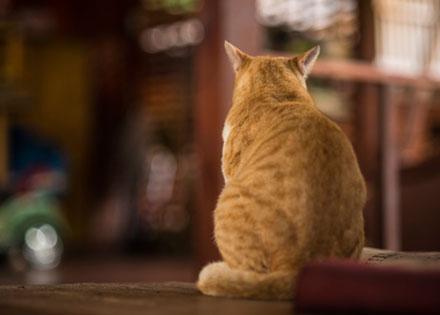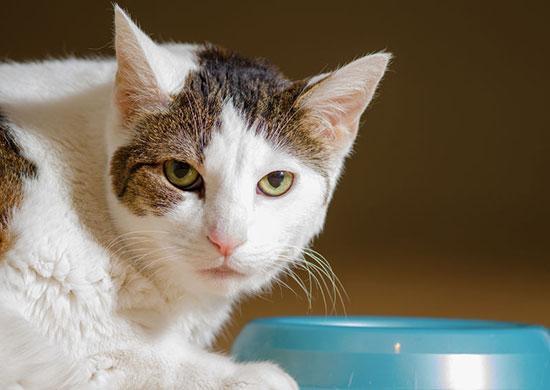This content is archived from the Feline Nutrition Foundation
Answers: Why Won't My Cat Eat?
- Updated: Friday, May 03, 2019 02:19 PM
- Published: Saturday, September 16, 2017 02:29 PM
- Written by Elisa Katz, DVM
I have a ten-year-old cat who seems to be very healthy. But, just yesterday she refused her food. What can cause her to lose her appetite? Should I be worried that there's a problem?
A cat may choose not to eat for many different reasons: nausea, pain, a mechanical obstruction, an inability to smell the food, a foreign substance such as a medication or a supplement in the food, a sudden change of diet or she is focused on another physiologic process, such as breathing.
Nausea can have many different causes. It can include your cat eating something such as toilet paper or spoiled food, or it may indicate a potentially life-threatening inflammation of the pancreas, called pancreatitis. In most cases, nausea is accompanied by drooling or vomiting. If she is not eating and drooling or vomiting, you should seek veterinary care as soon as you are able, to determine and treat the cause. Antibiotics and other medications given to cats can upset their stomachs and cause loss of appetite as well.
Pain can cause your cat to refrain from eating. It could be mouth pain from diseased teeth, stomach pain from an ulcer or tumor and intestinal pain from an ulcer, tumor or an obstruction. Signs of pain typically include abnormal posture such as an arched back and a constant shifting of position. She may also bite at or look at the abdomen or the painful area. Signs of mouth pain include drooling, pawing at the mouth or rubbing of the mouth against things. In the case of dental problems you may also see some blood from the mouth or even find broken teeth. This happened with one of my own cats who hid his pain for months before I finally detected it.
A mechanical obstruction can be a serious and life-threatening condition. It may or may not be accompanied by pain. If your cat vomits multiple times, especially if she is consistently after eating, then she may have an obstruction. She should be seen by a veterinarian who can examine and do some type of imaging such as x-rays or ultrasound as soon as possible.
An inability to smell the food may cause your cat to turn away. If she has been experiencing nasal congestion, she may not want to eat because she is unable to smell the food. Being able to smell is very important to cats. In this case, warming the food may help to increase the odor, so that she can smell it. Be careful not to inadvertently cook raw cat food. You can warm it by placing it in a plastic bag and then into a bowl of warm water for a few minutes.
 A foreign substance in the food can turn your cat off from eating. Many people think it is easier to put medications or supplements in their cats' food because everyone knows how well they take pills and medications. If you have been putting a medication or supplement in kitty's food and she stops wanting to eat, it may be a "learned aversion" due to tasting the foreign substance. You will need to stop doing that until she begins eating normally again. Then, if you must put a medication or supplement in the food, you should put it in a separate portion from the main meal so that she does not develop a learned aversion again.
A foreign substance in the food can turn your cat off from eating. Many people think it is easier to put medications or supplements in their cats' food because everyone knows how well they take pills and medications. If you have been putting a medication or supplement in kitty's food and she stops wanting to eat, it may be a "learned aversion" due to tasting the foreign substance. You will need to stop doing that until she begins eating normally again. Then, if you must put a medication or supplement in the food, you should put it in a separate portion from the main meal so that she does not develop a learned aversion again.
A sudden change in diet may be a reason that your cat won't eat. This may be especially true if you have changed the form of the diet from dry to canned or raw cat food. Despite being an obligate carnivore, if she was not raised eating that form of diet, she may not immediately recognize it as food. In this case, a short 24-hour fast may make her hungry enough to try the new form of food. It is not recommended to purposely fast your cat for more than 24 hours because of the possibility of developing hepatic lipidosis.
A focus on another physiologic process can also cause your cat to not want to eat. I have seen feline patients who stop eating because they are more focused on breathing, which is more important for survival than eating. This can be very serious and requires veterinary care as soon as possible. There may be fluid in the chest due to a heart problem or other cause that will need to be addressed.
What can you do to get your cat to eat? There are a few things that you can try to help tempt your kitty.
Bone broth is a very nutritious, gut-healing broth made from simmering of bones with very little meat. You may use the instructions for making meat or fish stock in "Feline Inflammatory Bowel Disease: Nature and Treatment" or you may find premade bone broth by The Honest Kitchen at many pet specialty retailers.
Fish or very odorous food can sometimes tempt your kitty, especially if congestion is the reason for the loss of appetite. Bonito flakes can be sprinkled on the food or fish oil can be dribbled on it to add some fish odor.
In multi-cat households, it is important to verify that all cats are eating regularly. For this reason, They should be watched when fed. Food should not be left unmonitored. This becomes even more important if one of the cats is vomiting or losing weight.
Hand feeding will tempt some cats into eating. Put a small bit of food on the tip of your finger and offer it to her. Eating a few morsels this way can sometimes get her started as she is willing to eat more on her own.
Additional Reading
Cats and Cantaloupe: A Method to their Madness
Answers: Let's Talk About Cat Barf
Bottom Line
Loss of appetite in cats, especially for more than 24-36 hours, can become very serious. She should be examined by a veterinarian as soon as possible if they do not eat for 36 hours. If vomiting is occurring, take kitty to the vet sooner.
Note: Feline Nutrition provides feline health and nutrition information as a public service. Diagnosis and treatment of specific conditions should always be in consultation with your own veterinarian. Feline Nutrition disclaims all warranties and liability related to the veterinary advice and information provided on this site.
Dr. Elisa Katz, DVM, is a graduate of Ohio State University and is the owner of Natural Pet Animal Hospital in Bourbonnais, Illinois. She practices holistic and integrative medicine focusing on proper diet and nutrition. Dr. Katz shares her home with four kitties and one dog.





